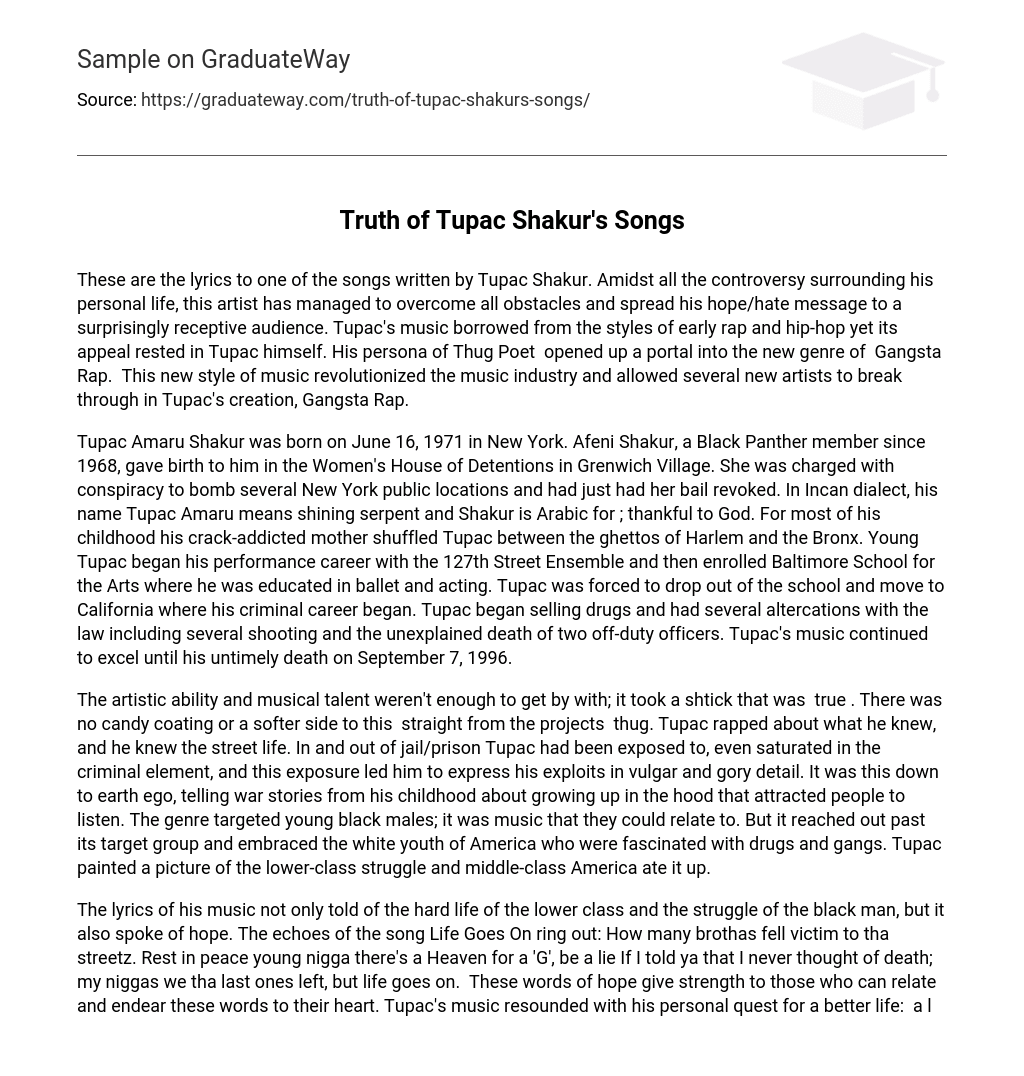Tupac Shakur, despite the controversy surrounding his personal life, has triumphantly overcome obstacles and shared a message of hope and hate with an unexpectedly receptive audience. His lyrics are inspired by early rap and hip-hop styles but it is Tupac himself who captivates listeners. Known as Thug Poet, he has pioneered a genre called Gangsta Rap which revolutionized the music industry and paved the way for emerging artists.
Tupac Amaru Shakur was born on June 16, 1971 in New York. His mother, Afeni Shakur, a Black Panther member since 1968, gave birth to him in the Women’s House of Detentions in Grenwich Village. She was charged with conspiracy to bomb several New York public locations and had just had her bail revoked. In Incan dialect, his name Tupac Amaru means shining serpent and Shakur is Arabic for thankful to God.
During his childhood, Tupac constantly moved between the ghettos of Harlem and the Bronx by his crack-addicted mother. He began his performance career with the 127th Street Ensemble and later attended the Baltimore School for the Arts, where he studied ballet and acting. However, he was forced to drop out of school and move to California, where he embarked on a criminal path.
Tupac started selling drugs and faced several legal issues including multiple shooting incidents and the mysterious deaths of two off-duty officers. Despite his troubles,Tupac’s music continued to thrive until his untimely demise on September 7, 1996.
Tupac’s success was not solely due to his artistic talent and musical skill. What set him apart was his genuine and unwavering persona. He didn’t hide or soften his background or image. Coming straight from the projects, Tupac embodied the tough thug archetype. He rapped about his firsthand experiences and deep understanding of street life, drawing from his time in jail and prison where he became intimately familiar with the criminal underworld. This raw authenticity captivated audiences as he shared stories from his disadvantaged youth growing up in neighborhoods facing challenges. While targeting young black males, Tupac’s music also resonated with white youth intrigued by drugs and gangs in America. Through his lyrics, Tupac vividly depicted the struggles faced by lower-class individuals, striking a chord even with middle-class America.
Tupac’s music lyrics not only depicted the struggles and challenges faced by black individuals and the lower class, but also delivered a message of hope. In one of his songs, “Life Goes On,” he expressed powerful words that resonate: “How many brothers fell victim to the streets? Rest in peace, young brother, there’s a Heaven for a ‘G’. It would be untrue if I claimed to have never contemplated death. My friends, we are the last ones remaining, yet life goes on.” These uplifting words empower those who can relate and deeply touch their hearts. Tupac’s music embodies his personal quest for a better life: “A life where we don’t rely on welfare assistance to support our entire family. Perhaps I am the cause of the strife and anguish, shedding tears in my room because I didn’t want to burden others. Witnessing my mother embrace me with open arms, all worries dissipate with her unconditional love.” The words of this revolutionary poet and rapper brought strength and solidarity to this emerging genre known as Gangsta Rap.
It was the man behind the music that brought it to life – Tupac Shakur, the creator of Gangsta Rap, is solely responsible for its popularity.





